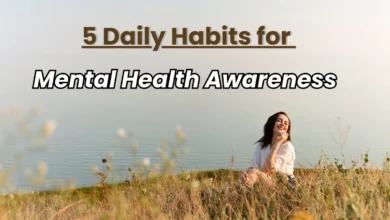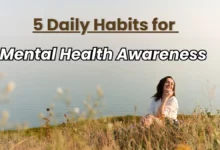Emotional Healing: How to Feel Better Mentally

Introduction: When You Can’t Explain What’s Wrong
You’re mentally drained, emotionally tired, and everything feels off — but when someone asks “What’s wrong?” you don’t even know where to begin. If this sounds familiar, you might be in need of emotional healing — even if you can’t put your pain into words.
In this blog, we’ll explore what inner healing really means, how to recognize the signs, and what you can actually do to feel better mentally — without moving to the mountains or deleting your entire existence off social media.
What Is Emotional Healing?
Emotional healing is the process of acknowledging, accepting, and working through emotional pain, distress, or trauma — even when the source isn’t obvious. It’s not about “just thinking positive.” It’s about reconnecting with your inner self and allowing space to process unspoken feelings.
“Healing doesn’t mean the damage never existed. It means the damage no longer controls your life.” – Akshay Dubey
Synonyms of Emotional Healing:
- Mental recovery
- Inner healing
- Healing emotional pain
- Feeling better mentally
- Emotional wellness
These terms are often used interchangeably, and all point toward regaining a sense of emotional balance.
Signs You Might Need Emotional Healing
If emotional overthinking keeps you up at night, it may be a sign your mind is trying to process something deeper. Here’s how to stop overthinking at night and calm your inner world before bed.
You don’t have to experience a major trauma to need inner healing. But first, let’s talk about the subtle yet powerful signs that your mind might be quietly asking for help:
- You constantly feel numb or emotionally detached
- You feel sad or anxious without a clear reason
- Overreacting to small triggers
- A deep sense of exhaustion — mentally and physically
- Struggling to enjoy things you used to love
- You’re always in survival mode
These are symptoms your nervous system may be holding on to unresolved emotional pain. Ignoring them often leads to burnout or chronic stress.
Why Unnamed Emotional Pain Delays Healing
Here’s the thing: emotional pain doesn’t always show up as a dramatic breakdown. Sometimes, it disguises itself as endless scrolling, unexplained irritability, or “just tired” feelings that never go away.
Often, people dismiss their emotional wounds because it feels silly to say, “I don’t even know why I’m upset.” However, your emotions don’t need a clearly defined reason to be valid — they simply need space to be acknowledged.
Unidentified emotional stress can build up from:
- Microtraumas (toxic work environments, emotional neglect)
- Long-term overwhelm
- Repressed childhood emotions
- Repeated disappointments
If you’re waiting for a “valid” reason to start your inner healing, stop. Your current feelings are reason enough.
7 Ways to Start Healing Emotionally
This is where the real inner healing begins — and no, it doesn’t require crystals (unless you’re into that sort of vibe). These techniques can gently guide your nervous system toward emotional wellness:
1. Feel Your Feelings — Don’t Judge Them
Rather than pushing your emotions away, try allowing them to simply exist without judgment. Cry. Journal. Rant. Feel. Emotional healing starts by letting emotions move through you.
2. Label the Emotion (Even If You’re Guessing)
Research shows that naming your feelings lowers their intensity. Start with basics like sad, angry, lonely, overwhelmed.
3. Practice Mindfulness
Meditation, breathwork, or simply being present helps reset your emotional state. It’s a mental detox that quiets emotional chaos.
4. Limit Emotional Drainers
Unfollow that one person who triggers self-doubt. Reduce screen time. Create space for emotional clarity.
5. Talk to Someone (Even If It’s Not a Therapist Yet)
A trusted friend, a support group, or yes, a therapist — talking out loud is an emotional release in itself.
6. Prioritize Sleep & Movement
In fact, your physical health plays a bigger role in your emotional healing than most people realize. A well-rested brain processes pain better.
7. Create Tiny Joy Rituals
Light a candle. Listen to a nostalgic playlist. Walk barefoot in the grass. Joy rewires your brain toward healing.
“You cannot heal in the same environment that made you sick.” – Unknown
When to Seek Support for Emotional Healing
Self-healing is powerful, but you don’t have to do it alone. If you’re struggling to function, constantly overwhelmed, or feel emotionally stuck, talking to a licensed mental health professional is a brave and healing next step.
Therapy helps you:
- Explore root emotional patterns
- Gain tools to regulate your emotions
- Learn to break the cycle of emotional suppression
Remember: reaching out is not weakness — it’s wisdom.
Final Thoughts: You’re Not Broken
Emotional healing isn’t a straight line. Some days you’ll feel lighter. Some days, heavier. That’s part of the process.
If you’re feeling off but can’t explain why, don’t wait for a dramatic breakdown. Healing can begin now — with gentle, honest attention to your inner world.
You’re not broken. You’re human. And healing is not only possible — it’s powerful.










Can you be more specific about the content of your article? After reading it, I still have some doubts. Hope you can help me. https://www.binance.info/es-AR/register?ref=UT2YTZSU
Hey, I’ve been playing on cvin for a bit and it’s a pretty cool experience. I like their rewards program. Worth a look if you’re searching around. Give them a peek at cvin.
I don’t think the title of your article matches the content lol. Just kidding, mainly because I had some doubts after reading the article.
Your article helped me a lot, is there any more related content? Thanks!
Thank you for your sharing. I am worried that I lack creative ideas. It is your article that makes me full of hope. Thank you. But, I have a question, can you help me?
Thank you for your sharing. I am worried that I lack creative ideas. It is your article that makes me full of hope. Thank you. But, I have a question, can you help me?
Your article helped me a lot, is there any more related content? Thanks! https://accounts.binance.info/pl/register-person?ref=UM6SMJM3
Thank you for your sharing. I am worried that I lack creative ideas. It is your article that makes me full of hope. Thank you. But, I have a question, can you help me? https://accounts.binance.info/fr/register?ref=T7KCZASX
**mitolyn**
Mitolyn is a carefully developed, plant-based formula created to help support metabolic efficiency and encourage healthy, lasting weight management.
Your article helped me a lot, is there any more related content? Thanks! https://accounts.binance.com/fr/register?ref=T7KCZASX
I truly enjoy reading on this web site, it holds great blog posts. “Never fight an inanimate object.” by P. J. O’Rourke.
**herpafend official**
Herpafend is a natural wellness formula developed for individuals experiencing symptoms related to the herpes simplex virus. It is designed to help reduce the intensity and frequency of flare-ups while supporting the bodys immune defenses.
**prostafense**
ProstAfense is a premium, doctor-crafted supplement formulated to maintain optimal prostate function, enhance urinary performance, and support overall male wellness.
Can you be more specific about the content of your article? After reading it, I still have some doubts. Hope you can help me.
Your point of view caught my eye and was very interesting. Thanks. I have a question for you. https://accounts.binance.com/es-AR/register-person?ref=UT2YTZSU
Thank you for your sharing. I am worried that I lack creative ideas. It is your article that makes me full of hope. Thank you. But, I have a question, can you help me? https://accounts.binance.com/kz/register-person?ref=K8NFKJBQ